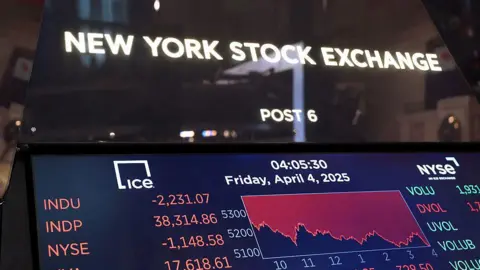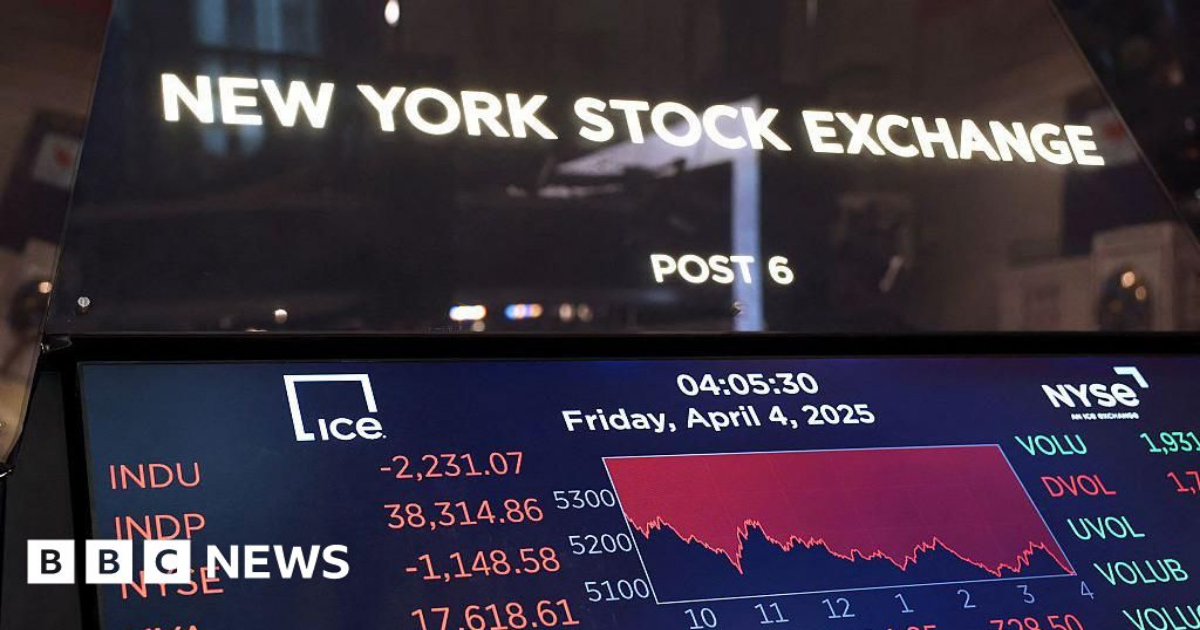Simon Jack
Business editor

 Getty Images
Getty Images
As stock markets continue to tumble after the US imposition of sweeping and swingeing tariffs, many are asking does this qualify as a stock market “crash” and what that could mean for them.
The word crash has been used sparingly over the decades and is usually reserved for a fall of over 20% from a recent peak in a day, or over the course of a couple of days.
On 19 October, 1987 – also known as Black Monday – the US stock market lost 23% of its value in a single day, and other stock markets had similar falls. The UK FTSE index fell 23% over two days – partly because it closes earlier than New York, and so it often plays catch up with whatever happens in the US the next morning.
That was most definitely a crash.
In 1929, the US stock market lost over 20% of its value in two days – and 50% within three weeks. That was the famous Wall Street Crash that ushered in the great depression of the 1930s.
By comparison, the US stock market has lost around 17% of its value from its peak in February and is now down 2% from where it was this time last year.
Nevertheless, these are the biggest and quickest declines we have seen in world markets since they were gripped by the panic of Covid-19 in early 2020.
A decline of 20% from a peak is considered a “bear market” – a description of a market that appears to be more likely to go down than go up. We are very close to that description right now.
How does it affect you?
While many people own stocks and shares directly, most people’s exposure to stock markets come through their pension plans. There are two types – defined benefit schemes which guarantee a fixed pension income, and defined contribution where your pension pot rises and falls with financial markets.
That may sound like defined contribution plans are very vulnerable to this sell off – but not all of your contributions go into shares. Much of the money goes into safer investments such as government bonds. These tend to increase in value when stock markets fall as they are seen as a “safe haven” along with other assets such as gold.
That is exactly what has happened here.
Government bonds have risen in value and that can offset some or all of the fall in shares depending on how your pension savings are allocated.
The closer to retirement you are, the higher percentage of your pension pot is likely to be invested in bonds – so the less affected you will be.
There have been many falls like this in the decades since the Wall Street Crash but in the long term, shares have turned out to be a good investment – and pension savings is a long term game.
So, does it matter?
It does matter. A company’s share value is a measure of how profitable those companies are expected to be in the future. A plummeting market is an indication that most people think that most companies are likely to see their profits fall.
The markets believe that US President Donald Trump’s tariff bombshell is expected to raise prices, lower demand and reduce profits, making companies less valuable and more inclined to cut investment and jobs.
So the real warning sign here is not about the value of your pension but about the health of the economy in which we live and work.
Falls like this sometimes, often even, herald an economic downturn. That is more of a worry than the value of your pension, which has seen and will see volatility like this over the years.
But that’s not to say this is not a very big moment for the world economy.
